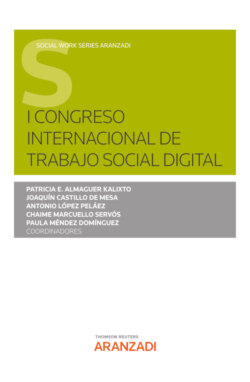Читать книгу I Congreso Internacional de trabajo social digital - Paula Méndez Domínguez - Страница 9
На сайте Литреса книга снята с продажи.
COMMUNICATION 1.3. DIGITAL INNOVATIONS IN MACRO SOCIAL WORK FIELD EDUCATION
ОглавлениеAUTHORS
• Sophia Sepp, New Mexico State University, Center on Immigration and Child Welfare
• Megan Finno-Velasquez New Mexico State University, Center on Immigration and Child Welfare
SUMMARY
This presentation seeks to highlight the efforts of the Center on Immigration and Child Welfare at New Mexico State University to engage masters level social work students in macro social work practicum opportunities and to address best practices for the effective structuring of online macro level practicum experiences. The Center on Immigration and Child Welfare (CICW) is a national resource center in the U.S. that focuses on building capacity of the U.S. child welfare system to respond to the unique needs of immigrant families and children. The CICW network consists of researchers and scholars, practitioners, including social workers and child welfare workers, lawyers and legal practitioners, and policy analysts. The Center’s current work since moving to New Mexico State University in 2017 has focused on vetting and disseminating the most current and salient policy, practice, and research resources that address the intersection of immigration and child welfare. The Center also conducts trainings, provides technical assistance, and facilitates communication among child welfare practitioners across the U.S. to share information and best practices on these issues.
Practicum opportunities with the Center on Immigration and Child Welfare enable students to directly participate in key elements of macro social work practice in an online environment. Students are able to engage in policy analysis and advocacy, research, and the development and dissemination of practice and policy recommendations and resources. All of these activities work toward the Center’s overarching goal of effecting systems-level change to improve programs and policies related to immigrant children and families involved in the public child welfare system in order to achieve positive outcomes of safety, permanency and well-being. Students are challenged to identify and apply the traditional practice behaviors and competencies of social work in the macro level, online context, exploring how to 1) demonstrate ethical and professional behavior; 2) engage diversity and difference; to advance human rights and social, economic, and environmental justice; 3) engage in practice-in-formed research and research-informed practice; and 4) assess, intervene, and evaluate practice with organizations, communities, and systems.
As the CICW is composed of practitioners and professionals across the U.S., students are challenged to engage in macro practice primarily via digital platforms. Students gain first-hand experience in offering online opportunities for training and technical assistance by participating in the development, facilitation and evaluation of online workshops and conference presentations offered by the CICW. Students help coordinate communications among network partners across various time zones, including ongoing convenings on the Zoom platform. Students assist in disseminating resources, information, and updates via targeted, topic-specific Google Groups and monthly, E-newsletters on MailChimp. These activities require attention to detail and to communication styles that will effectively engage the CICW’s virtual audience. Students also learn to design webinars and workshops that are adaptable to online platforms and that communicate the Center’s important topical information while also maintaining the interest and engagement of participants in an online setting i.e. utilizing polling, chatting, and breakout group features on Zoom. Students are then able to analyze their experiences in participating in and facilitating these various types of group convenings via traditional social work learning modalities such as process recordings that have been structured for the macro context.
The unique topical focus of the CICW on the intersection of immigration and child welfare issues combined with its unique structure as a geographically diverse network of professionals across the U.S. provides students with an unparalleled opportunity for engaging in macro level social work practice via various digital modalities. Students are constantly challenged to think critically, not only in learning and applying the information and content of immigration and child welfare work, but in how to facilitate meetings and engage effectively with professional partners, communicate and disseminate information in effective and engaging ways across digital platforms. Students must adapt their general perceptions of social work as an individual-level, direct practice to the systems-level, policy-orientated practice of the CICW.
Macro level social work practice offer unique opportunities for students to expand their perceptions and understandings of the social work practice arena. Students are able to gain experience in research and policy analysis and advocacy and how these processes inform the development of best practice. In order to ensure effective learning experiences, social work programs offering macro level practice should pay special attention to developing practicum curricula and seminar experiences with practice behaviors and competencies tailored to macro level work. This is especially important in generalist social work programs that may just be beginning to offer macro level opportunities. Macro level practice also offer potentially more opportunities for students to partner with geographically diverse and distant organizations and agencies, especially as platforms for digital engagement advance. With the increased utilization of digital platforms comes increased responsibility to continue to apply the core social work values of ethical practice and professionalism to virtual engagement modalities. As such, macro level social work practice in the increasingly digital world have the potential to offer students of the social work profession new and expanded opportunities to engage in critical thinking, analysis, and evaluation, ultimately yielding a new generation of social workers that more well-rounded in their abilities to navigate among the micro–, mezzo–, and macro modalities of practice.
OBJECTIVES
− Provide an overview of the way in which the Center on Immigration and Child Welfare at New Mexico State University offers online macro level social work practical opportunities.
− Discuss the modalities of digital engagement essential to the CICW’s operations and how student interns engage in these modalities during practice experiences.
− Provide recommendations for effectively facilitating macro level social work practice in a digital context.
URL: https://youtu.be/h7mB39On7CM
